
| WWT Shows | CLICK TO: Join and Support Internet Horology Club 185™ | IHC185™ Forums |

|
• Check Out Our... • • TWO Book Offer! • |
Welcome Aboard IHC185™  Internet Horology Club 185
Internet Horology Club 185  IHC185™ Discussion Site Main Page
IHC185™ Discussion Site Main Page  Horological Discussions, Questions and Answers
Horological Discussions, Questions and Answers  Pocket Watch Discussions
Pocket Watch Discussions  I've never seen anything quite like this one...
I've never seen anything quite like this one...
 Internet Horology Club 185
Internet Horology Club 185  IHC185™ Discussion Site Main Page
IHC185™ Discussion Site Main Page  Horological Discussions, Questions and Answers
Horological Discussions, Questions and Answers  Pocket Watch Discussions
Pocket Watch Discussions  I've never seen anything quite like this one...
I've never seen anything quite like this one...Go  | New Topic  | Find-Or-Search  | Notify  | Tools  | Reply to Post  |  |
| IHC President Life Member |
I've never seen anything quite like this one... Here's an Illinois 12-size, nothing unusual about the sculptured dial or hands. 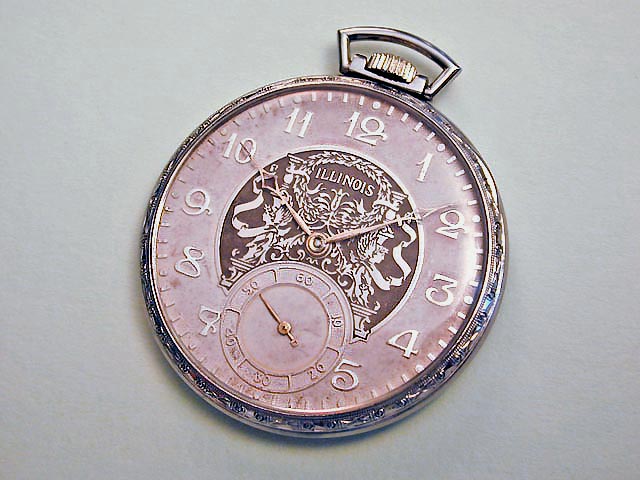 | ||
|
| IHC President Life Member |
Turning it over, the case-back and butler-finish look like many other watches. 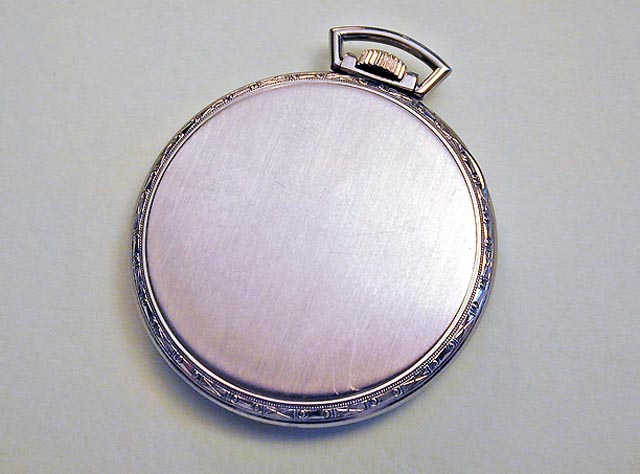 | |||
|
| IHC President Life Member |
Yawn, inside the case-back... WAIT A MINUTE! ..."SANGAMO" ...on a 12-size? 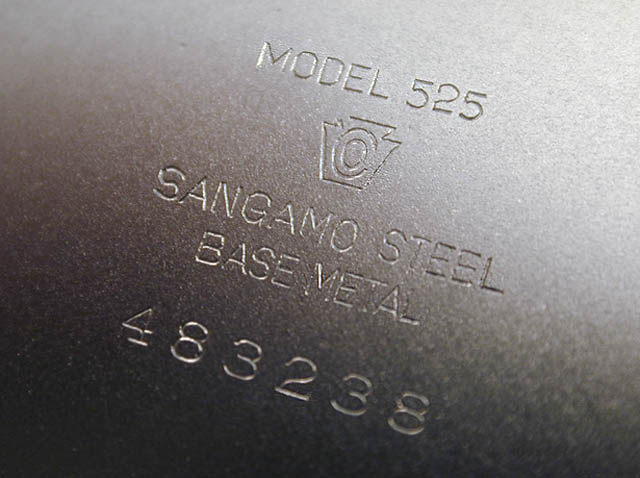 | |||
|
| IHC President Life Member |
And look at that movement, kinda reminds me of an "Illini" ...Book says "438" 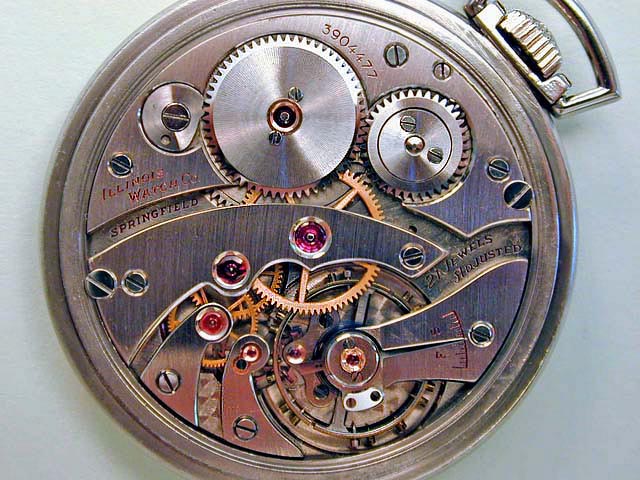 | |||
|
| IHC President Life Member |
Records show this 438 movement is from 1921 and the "Sangamo Steel" case? (As a RR collector I've never seen "Sangamo" on anything but Sangamos!) AND THIS IS A STAINLESS STEEL CASE, I PROMISE YOU! So tell me, what do you think is going on here??? | |||
|
| IHC President Life Member |
The "Illinois Encyclopedia" on page 160 reports only 1,090 of these movements... "438" - Temperature - Jewels friction-set in plates, beveled arm gold center wheel simple regulator. Double Roller (1919-1922) Incorrectly listed as a Model 5 but an examination of the movement clearly shows it to be Extra Thin Model 1 movement. | |||
|
The grade 438 was a very high quality extra-thin movement produced in the late 'teens up until about 1921. Illinois made 1,130 of this grade. Some may have been cased a little later but this 1st model movement was soon superceded by the Illini model and the 3rd model extra-thin movement (A.Lincoln, Marquis and Marquis Autocrat). It was always factory-cased, at first in fine 14K and 18K cases by Knapp and another unknown maker, but later in cases by Solidarity and Wadsworth. You can see my database of known examples HERE Some of the Wadsworth cases were gold-filled, but I have never seen these in cheaper cases. The only other example recorded in a Keystone case was very likely a re-case. I suspect that this very nice stainless steel case is a replacement for a gold case, perhaps melted in the Depression. For comparison, here is Bob Schussel's example (#3904476) immediately preceding yours in a 14K white gold Solidarity case. Other examples from this run, with your dial, are in Wadsworth cases. 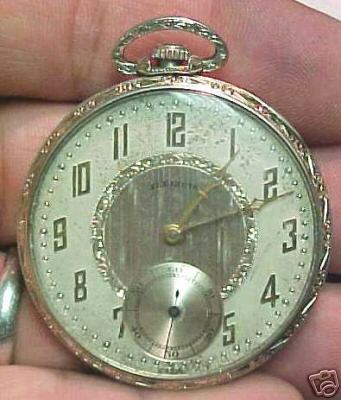 | ||||
|
This example (19j gr.437 - #3904312) is in a 14K Wadsworth case. [At least it was when this one sold on eBay -- many more of these have lost their cases in the latest "gold rush"] 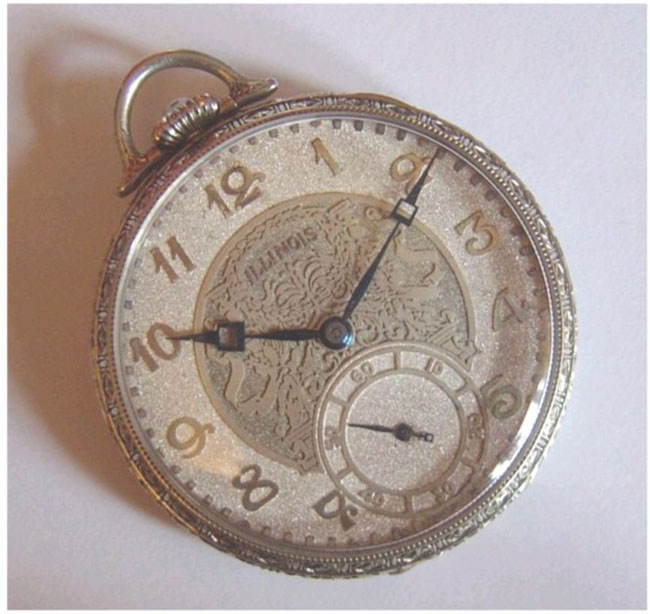 | ||||
|
Hmmm - ya know, I am still wondering. I don't think I have ever seen a steel case with carved bezels like this one. This does denote some quality. I was thinking the case markings are a little late-looking, too, but then found this from the back of a similarly-styled solid gold Keystone case on a 1927 Marquis-Autocrat. When did Illinois first use similar marking style for case models in their 16-size cases? I have asked Jim Carroll for his opinion on this as he has much more experience with the later thin-model cases. [edited to add my continued musings -- were case model numbers sequential in any sense and would a Model 525 be much later than a Model #207? ] 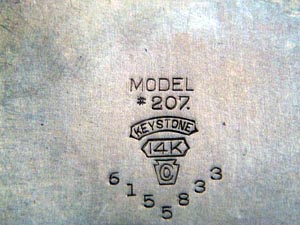 | ||||
|
Does this match the example on page 298 of the guide? Model 1, 12 size, extrs thin, bridge, open face, pendant set, motor barrel? It looks exact! ????????????? oops sorry Lindell, I missed that one! Great mystery huh?!!!!! Sheila | ||||
|
Sheila - yes, that's right. If you click the link I have in my first post you can see examples of all four grades in this model. | ||||
|
I don't know a thing about this, but from it, I learned the there was a UK Sangamo Company that made time switches, and that there was a Sangamo Clock Co. in Ill.!!!! Nice search! The mystery continues! Sheila | ||||
|
Jerry, I did indeed take a look at it, and wow that last watch was gorgeous! I also loved all the information, wonderful. Thank you. Sheila | ||||
|
I can report another sighting of a model 525 Sangamo Steel case, substantially identical in appearance to Lindell's. This one was empty, found in a box full of 12s Illinois relics. The case number is 433106, and I admit with embarrassment that I created a Frankenwatch by putting a Grade 525 movement in it and giving it to a grandson, who carries it regularly. Joe Jones | ||||
|
| IHC Life Member Certified Watchmaker |
Hi While we are on strange cases. What can you tell me about the is one? 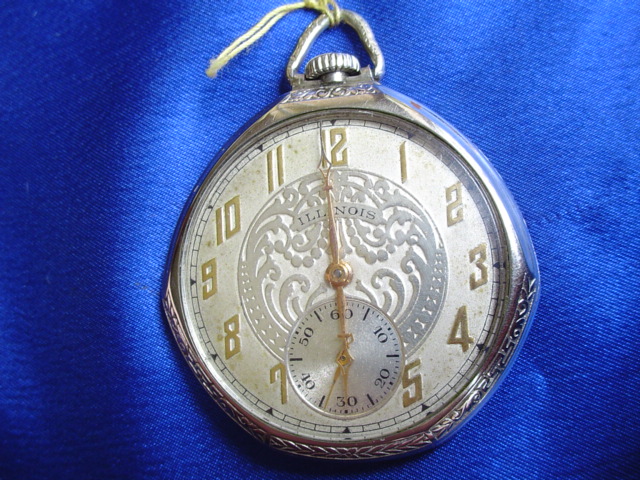 | |||
|
| IHC Life Member Certified Watchmaker |
p2 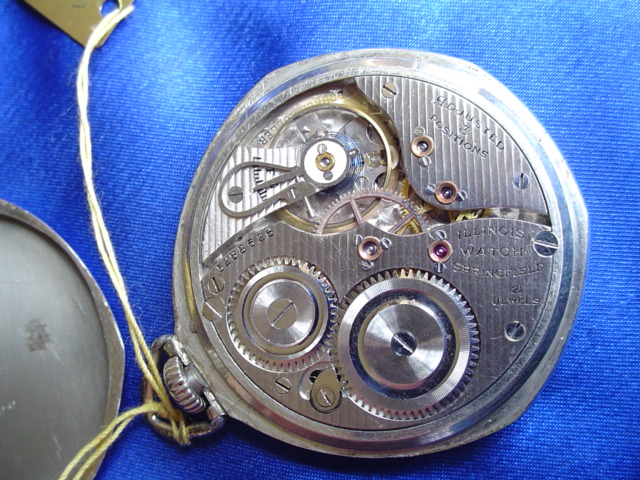 | |||
|
| 12-Size Expert |
As I was the one who asked Lindell to show his case I would like to make a few comments. 1) Little is known about the thin line movements (Grades 435 thru 439). No ads seem to exist. These were high grade watches and the majority came with beautiful dials and in solid gold cases.Some of the later movements are found in gold filled cases. Many of the cases were made by an unknown casemaker.None of the cases I have seen were made by Keystone. 2) Stainless steel cases were not used on dress watches until the 1930s.--most I have seen were for European watches.This is the first stainless steel case I have seen for a 12 size American dress watch. Clearly the quality of the case is much nicer then most replacement cases such as the Star Cases. 3) Cary ,some Gruen Ultra thins came in gold filled cases but these cases have the Gruen name on them. BOTTOM LINE-Since my grade 438 was made at the same time as Lindells (and in a gold case) the odds are that his watch has a replacement case. That being said I think the Sangamo case is a great curiosity and worthy of collecting. Bob | |||
|
| 12-Size Expert |
Just like the watch Jerry showed I have a grade 439 marked Extre (N=330) with the serial number 3,904,936 that is only a few hundred off from Lindell's watch. It also is cased in a 14kt Aristcrat Wadsworth case and has hands similar to Jerrys and Lindells second hand. Thus the evidence seems to favor a recase rather than being originally case in a stainless steel case. Bob | |||
|
| 12-Size Expert |
Someday soon I hope to offically announce that Lindells and my watch are united for eternity as they consecutive serial numbers! In a conversation I had with Lindell he said he would hold his watch for me. Both of us felt than when a matching pair is found they should be kept together for the sake of the hobby. Even though the serial numbers are consecutive the dials are very different. Whether the cases differed originally can't be answered. We also dicussed the 525 on the case--his case was made for thin model Illinois watches. The 525 Marquis is a 12 size 17j extra thin model that Illinois was producing at the same time as the Grade 435-439 thins models were being manufactured. Illinois may have been experimenting with exotic cases as 50 of the 525s were made with Aluminum cases and movements. Hopefully others can help resolve whether the 525 on the stainless steel case is a coincidence or not. Bob | |||
|
Jim Carroll discusses model names he describes many of the cases that the 3rd model extra-thin watches came in. Several of the Keystone cases had model numbers, including: Dean - model 207 Pioneer - model 527 Rialto - model 182 Looking at the advertisements that he reproduces one does not see "bulldog"*-style cases (except the Acorn) until the late '20s. Some other case research that I have seen suggests that Keystone cases with model numbers assigned to them did not start appearing until the late '20s (RR collectors - any comment?). From these (as yet few facts) it looks like the 525 (as well as the 527) case model numbers may only coincidentally match movement grade numbers. The 182 and 207 do not match thin grades. It also would appear that the Sangamo Steel cases, based on style and the appearance of a model number, are probably from the late '20s. * "bulldog" case refers to a case with no neck between the case body and where the bow attaches. | ||||
|
| 12-Size Expert |
Jerry I think the Sangamo 525 case name may be more than coincidence. 1) The Sangamo name is the only one directly associated with the Illinois Watch Co. Most of the other names mentioned for the thin models are more generic. The Pioneer and Acorn are model names for the 19j A. Lincoln and the Eton for the 17j Marquis Autocrat thin model. 2) I have never seen a "base metal" case made by any other case company for the Illinois Thin Models . 3) The Grade 525 contains a run of 50 Alumnium watch movements and cases.In 1921/22 both Alumnium and Stainless Steel were considered somewhat exotic metals. 4) Whether the case was made in the early or late part of the 1920s a mystery remains why would Keystone go to the trouble of making a "base metal" case out of an unusual and harder to work metal. My theory is that Stainless steel was considered very fashionable when it became commerically available( major metalurgy advances were made in the early 1920s). Even some Patek Philippe pocket watches were made in the 1930s with Stainless Steel cases. 5) If you look at the picture of my watch the case seems to fit your definition of a bulldog case in the sense that the crown almost touches the case--my watch was made around 1922 At the very least the Keystone 525 Sangamo case was probably an expensive and very fashionable replacement case. It may have even been a way to move some left over factory movements . Bob | |||
|
This discussion has led me to the sense that Lindell's case may indeed be original. However it has also led me to believe that, although the 1st model XT (grades 435,437, 438 & 439) was reportedly made, as a movement, between 1918 and 1921, many of these from the last production group (3,904,001 to 3,905,000) probably were not cased until later. Out of several dozen examples recorded, only one movement from an earlier run has a bulldog case, and that one has a 1930 presentation date. A great part of the last run (like yours and Lindell's) are in bulldog cases. The only presentation date I have noted from this last group is 1938. I believe that much of this last group of 1st model XT movements was probably cased after 1926 (when the Illinois ads show that most 12-size case pendants still had necks). I think that the steel case may be from this later period. | ||||
|
Re your Keystone Sangamo Base metal cases, sorry for not coming in sooner; I have been on vacation in Portugal. I have two records of these cases Sangamo Base Metal No. 433026, No. 483246. I always put these types of cases down to the last of the Illinois thin movements that Hamilton wanted to get rid of in the 1930’s I have also seen Star Watch Co. cases in rolled gold being used, I would guess that Lindell’s watch was probably in a 14K case and was changed. Jim Carroll | ||||
|
Lindell’s watch has open Diamond gold minute and hour hands, and a gold square spade second hand. I would of interest to see if the winding arbour is the same size as a 3rd model as the watch crown looks original to the case, maybe Jerry can tell us a little about the winding arbour sizes on the 1st and 2nd models. I have found in 3rd model a lot of the named cases have different shaped crowns, and are not interchangeable. Jim Carroll | ||||
|
| 12-Size Expert |
Even if these watches were cased in the early 1930s a Stainless Steel case would have been seen as quite a novelty and fashion statement. An analogy is the use of Titanium or Ceramics in todays wristwatch cases.In addition it was elaborately finished on the bezel etc compared to other Stainless Steel cases. My point is that whether or not the Sangamo Stainless Steel case was a "replacement case" it was very, very desirable (as compared to those like the Star Watch Case Co) as it was well above average in quality and fashion. Bob | |||
|
| Powered by Social Strata |
| Your request is being processed... |
|
Welcome Aboard IHC185™  Internet Horology Club 185
Internet Horology Club 185  IHC185™ Discussion Site Main Page
IHC185™ Discussion Site Main Page  Horological Discussions, Questions and Answers
Horological Discussions, Questions and Answers  Pocket Watch Discussions
Pocket Watch Discussions  I've never seen anything quite like this one...
I've never seen anything quite like this one...
 Internet Horology Club 185
Internet Horology Club 185  IHC185™ Discussion Site Main Page
IHC185™ Discussion Site Main Page  Horological Discussions, Questions and Answers
Horological Discussions, Questions and Answers  Pocket Watch Discussions
Pocket Watch Discussions  I've never seen anything quite like this one...
I've never seen anything quite like this one...©2002-2025 Internet Horology Club 185™ - Lindell V. Riddle President - All Rights Reserved Worldwide

